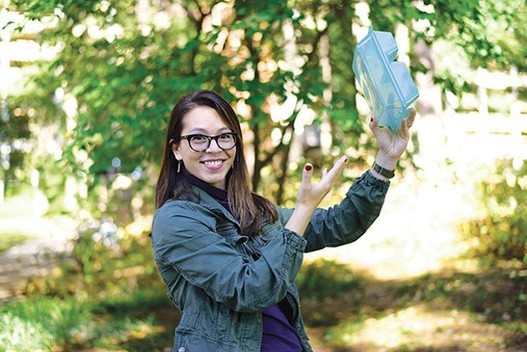
OEN Member NewsGO Box and GreenBox champion the use of reusable over compostable containers (Indy Week)
Six days a week, Durham sends trucks to the Sampson County Landfill, an hour and forty-five minutes away. Since the Durham landfill filled up a few years ago, it’s been one of the only viable options for trash disposal. Every month, half a ton of that waste comes from your favorite restaurants’ to-go boxes. But Don’t Waste Durham hopes to reduce the toll with GreenBox, a reusable takeout container program—one of several initiatives the community organization has implemented to reduce consumer waste.
GreenBox containers will be available at local eateries by February 2017. With the GreenBox app, consumers can sign up for a yearly $25 membership to check out the containers from participating Durham restaurants. In its launch year, the program will be free. Nine eateries have already joined, including Luna Rotisserie, Toast, Durham Co-op Market, and Nanataco. When customers are finished with the box, they can drop it off at another participating restaurant—no matter where they first got it—and pick up another next time they want food to go. Restaurants will even wash the boxes, saving you some time in the kitchen.
“We really think that reuse is going to be more and more a part of our future,” says Crystal Dreisbach, DWD’s founder. “Why not start in Durham? Why not begin with us?”
DWD will throw a Kickstarter launch party on October 22 at Bull McCabe’s Irish Pub, and plans to feature at least twenty partnering restaurants by then. The organization aims to raise $22,000. Reduced-price GreenBox memberships are among the donation incentives.
Program organizer Noah Marsh said the box will cost restaurants between seven and fifteen cents per use, cheaper than many disposables. The hope is that this will encourage restaurants to save money.
Similar to-go box programs operate in San Francisco and Portland, under the direction of Laura Weiss of GO Box. In the five years since its launch, the company has avoided using 100,000 disposables.
“A big part of the footprint of a disposable container of any kind is thinking about where it comes from and how it was produced,” Weiss says.
Both GO Box and GreenBox champion the use of reusable over compostable containers. The latter are often manufactured using coal in China, then shipped to North Carolina. This shipping and production process can make compostable containers much less sustainable than they seem, especially if they end up in landfills, where they can create potentially explosive pockets of gas and make the land unstable.
DWD organizers know that changing the disposable culture will take hard work, but they believe Durham is the place to do it.
“If we can get a lot of Durhamites doing a small habit change, we can make a huge impact,” Dreisbach says.
After the launch year, Dreisbach hopes to expand to other Triangle towns and turn this community organization into a for-profit business that aims to help people and the environment.
Maybe through GreenBox and a little community support, Durham can stop at least a couple of those trucks from trekking out to the Sampson County Landfill.
Source: www.indyweek.com

